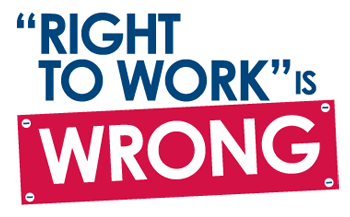This Research Study, conducted by researchers at the Illinois Economic Policy Institute and the University of Illinois at Urbana-Champaign, investigates the effect “right-to-work” laws passed in Midwest states have on workers. Researchers Frank Manzo IV of the Illinois Economic Policy Institute and Robert Bruno of the University of Illinois, Urbana-Champaign compared Right to  Work states for which there is available data—Indiana, Michigan and Wisconsin—to three Midwest states that remained collective-bargaining states—Illinois, Minnesota and Ohio—from January 2010 through December 2016.
Work states for which there is available data—Indiana, Michigan and Wisconsin—to three Midwest states that remained collective-bargaining states—Illinois, Minnesota and Ohio—from January 2010 through December 2016.
What the study found:
As of 2016, there were significant differences between the two groups of states:
• Workers in Indiana, Michigan, and Wisconsin earned 8.0 percent less per hour on average than their counterparts in Illinois, Minnesota, and Ohio. The median worker earned 5.9 percent less.
• The union membership rate was 11.5 percent in Indiana, Michigan, and Wisconsin compared to 13.7 percent in Illinois, Minnesota, and Ohio.
• The unemployment rate was 4.9 percent in Indiana, Michigan, and Wisconsin, marginally lower than the 5.1 percent rate in Illinois, Minnesota, and Ohio.
In Addition:
On average, RTW legislation has statistically reduced the hourly wages of:
• Construction and extraction workers by 5.9 percent.
• Workers in service occupations, including police officers and firefighters, by 3.1 percent.
• Workers in office and administrative support roles by 2.7 percent.
• Employees in retail and business sales by 2.4 percent.
• Professional, educational, and health workers by 1.9 percent.
In Indiana, Michigan, and Wisconsin, the introduction of RTW laws has statistically reduced the unionization rate by 2.1 percentage points on average and lowered real hourly wages by a total of 2.6 percent on average.
Report Summation:
“Lawmakers in other states that are debating the merits of passing ‘right-to-work’ laws should consider these research findings. Between 2010 and 2016, the enactment of ‘right-to-work’ legislation reduced unionization and resulted in lower hourly earnings on average in states across the Midwest. Ultimately, ‘right-to-work’ laws have had negative consequences for many workers in Indiana, Michigan, and Wisconsin.”





